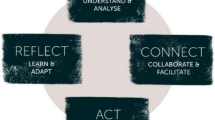Abstract
In current debates over thefuture of core institutions in a `knowledgesociety', universities figure most prominently. It seemsclear that they are crucial nodes in theoverall knowledge producing system, which, however,need to be repositioned and reformed.Therefore, the learning capacities ofuniversities are of central relevance. But howdo universities adapt to new challenges? Thecentral claim of the paper is that the rapidchange of pace at the level of higher educationdiscourse is hardly met at the level ofuniversities. Here, one has to take the path-dependentcharacter of their structures, practices andidentity concepts into account. Therefore, learning the`new, new thing' is a more cumbersomeprocess than might be expected at first sight.Empirical evidence for this claim is drawn fromthe institutionalization of technology transferoffices at German universities. Based on thesefindings, further general policy and researchperspectives on the role of path dependency inuniversity structures are discussed at the endof this paper.
Similar content being viewed by others
References
Ash, M. (ed.) (1997). German Universities Past and Future.Crisis or Renewal?New York, NY and Oxford: Berghan Books.
Bell, D. (1973). The Coming of Post-Industrial Society.A Venture in Social Forecastin. New York, NY: Basic Books.
Clark, B.R. (1995). Places of Inquiry.Research and Advanced Education in Modern Universities. Berkeley et al., CA: University of California Press.
Clark, B.R. (1998). Creating Entrepreneurial Universities.Organizational Pathways of Transformation.Surrey: Pergamon.
Elle, H.D., Huckestein, B., Masanek, I., Roentgen, F. and Glissmann, P. (1998). Hochschul-transferstellen in Nordrhein-Westfalen.Entwicklung, Leistungen, Perspektivei. Studie zur Evaluierung im Auftrag des Ministerium für Wissenschaft und Forschung des Landes Nordrhein-Westfalen, Köln: Hans-Dieter Elle + Partner.
Etzkowitz, H., Webster, A. and Healey, P. (1998). 'Introduction', in Etzkowitz, H., Webster, A. and Healey, P. (eds.), Capitalizing Knowledge.New Intersections of Industry and Academia. New York, NY: State University of New Press, pp. 1-17.
Geiger, R.L. (1986). To Advance Knowledge.The Growth of the American Research University, 1900-1940. New York: Oxford University Press.
Gibbons, M., Limoges, C., Nowotny, H., Schwartzman, S., Scott, P. and Trow, M. (1994). The New Production of Knowledge.The Dynamics of Science and Research in Contemporary Societies. London: SAGE.
Granovetter, M. (1985). 'Economic Action and Social Structure: The Problem of Embedded-ness', American Journal of Sociology 91, 481-510.
Guston, D.H. and Keniston, K. (1994). The Fragile Contract.University Science and the Government. Cambridge, MA: MIT Press.
Hannan, M.T. and Freeman, J. (1989). Organizational Ecology. Cambridge, MA: Harvard University Press.
Hasse, R. and Krücken, G. (1999). Neo-Institutionalismus. Bielefeld: Transcript-Verlag.
König, W. (1990). 'Technische Hochschule und Industrie-Ein Ñberblick zur Geschichte des Technologietransfers', in Schuster, H.J. (ed.), Handbuch des Wissenschaftstransfers.Berlin: Springer, pp. 29-41.
Krücken, G. (2001). 'Wissenschaft im Wandel? Gegenwart und Zukunft der Forschung an deutschen Hochschulen', in Stölting, E. and Schimank, U. (eds.), Die Krise der Universitäten. Leviathan Sonderheft, Opladen: Westdeutscher Verlag, pp. 326-345.
March, J.G. (1999). The Pursuit of Organizational Intelligence. Oxford: Blackwell.
McClelland, C.E. (1980). State, Society, and University in Germany 1700-1914.Cambridge: Cambridge University Press.
Meyer, J.W. and Rowan, B. (1977). 'Institutionalized Organizations: Formal Structures as Myth and Ceremony', American Journal of Sociology 83, 340-363.
MWF (1984). NRW-Forschungsbericht 1984. Düsseldorf: MWF.
Nowotny, H., Gibbons, M. and Scott, P. (2001). Rethinking Science: Knowledge and the Public in an Age of Uncertainty. Oxford: Polity Press.
OECD (1968). Gaps in Technology. General Report, Paris: OECD.
Powell, W.W. (1990). 'Neither Market Nor Hierarchy. Network Forms of Organizations', in Cummings, L.L. and Shaw, B. (eds.), Research in Organizational Behavior, Vol. 12. Greenwich, CT: JAI Press, pp. 295-336.
Reinhard, M. and Schmalholz, R. (1996). Technologietransfer in Deutschland-Stand und Reformbedarf.Berlin: Duncker & Humblodt.
Rothblatt, S. and Wittrock, B. (eds.) (1993). The European and American University since 1800.Historical and Sociological Essays. Cambridge: Cambridge University Press.
Schimank, U. and Winnes, M. (2000). 'Beyond Humboldt? The Relationship between Teach-ing and Research in European University Systems', Science and Public Policy 27, 397-408.
Schmoch, U., Licht, G. and Reinhard, M. (eds.) (2000). Wissens-und Technologietransfer in Deutschland. Stuttgart: Fraunhofer IRB Verlag.
Sims, H.P. and Gioia, D.A. (eds.) (1986). The Thinking Organization. San Francisco, CA: Jossey Bass.
Slaughter, S. (1993). 'Beyond Basic Science. Research University Presidents Narratives of Science Policy', Science, Technology, and Human Values 18, 278-302.
Slaughter, S. and Leslie, L.L. (1997). Academic Capitalism.Politics, Policies, and the Entrepreneurial University, Baltimore, MD and London: The Johns Hopkins University Press.
Slaughter, S. and Rhoades, G. (1996). 'The Emergence of a Competitiveness Research and Development Policy Coalition and the Commercialization of Academic Science and Technology', Science, Technology, and Human Values 21, 303-339.
Sporn, B. (1999). Adaptive University Structures.An Analysis of Adaptation to Socioeconomic Environments of US and European Universities. London: Jessica Kingsley.
Stehr, N. (1994). Knowledge Societies. Thousand Oaks, CA: Sage.
Turner, R.S. (1980). 'The Prussian University and the Concept of Research', Internationales Archiv für Sozialgeschichte der deutschen Literatur 5, 68-93.
Weick, K.E. (1979). The Social Psychology of Organizing, 2nd ed., Reading, MA: Addison-Wesley.
Weick, K.E. (1995). Sensemaking in Organizations. Thousand Oaks, CA: Sage.
Author information
Authors and Affiliations
Rights and permissions
About this article
Cite this article
Krücken, G. Learning the `New, New Thing': On the role of path dependency in university structures. Higher Education 46, 315–339 (2003). https://doi.org/10.1023/A:1025344413682
Issue Date:
DOI: https://doi.org/10.1023/A:1025344413682




